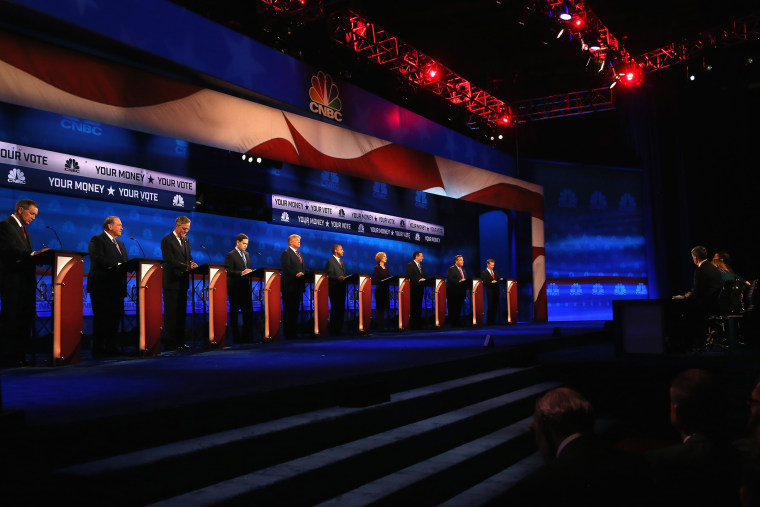It probably seemed like a good idea at the time. Republican presidential hopefuls, who at least claimed to be outraged by last week's CNBC debate, suddenly discovered the power of collective bargaining.
A plan was hatched: representatives of most of the GOP campaigns met on Sunday night with Mitt Romney's election lawyer, Ben Ginsberg, who drafted a letter of demands to networks about future debates. The document covered everything from debate durations, on-screen graphics, opening and closing statements, and even the temperature candidates wanted for venues.
Putting aside for a moment whether the list had merit -- it didn't -- the underlying point was that candidates believed they could leverage their power by acting together. After all, without them, there could be no debates -- networks would be expected to meet the Republicans' demands, fearing that the candidates simply wouldn't show up unless they were satisfied.
All that would be required to force systemic debate changes would be GOP candidates sticking together. It's exactly what didn't happen. The Washington Post reported today:
Sen. Ted Cruz (R-Tex.) said he has no interest in signing a letter of demands surrounding debates that presidential campaigns are crafting to send to television networks. Appearing on "The Kelly File" on Fox News, Cruz said he is "happy" to debate the candidates any time but is not interested in the letter. "I'm not interested in signing onto a letter of demands," Cruz said.
The original letter in question was written by Ginsburg, to be sent to networks after the campaigns endorsed it, reflecting the concerns raised by the candidates' representatives themselves.
But revolts like these only work when compatriots link arms, and in this case, Donald Trump, Chris Christie, Carly Fiorina, John Kasich, and Ted Cruz -- constituting a third of the Republican field -- have each said they're not endorsing the demands.
So what happens now?
The Washington Post added this morning that Ben Carson's campaign -- which initiated the intra-party discussions in the first place -- has distributed a new letter, despite the unraveling of the revolt.
[T]he letter represents a paring down from previous versions. What had been a demand for "equal questions of equal quality" has become an "equal number of questions." There is no longer a hint of prohibition against a "lightning round" or buzzers. And a note about the preferred room temperature, which was mocked by campaigns not signing the letter, is gone.
The Post's piece includes the full text of the letter, which would presumably be sent to networks sponsoring future Republican debates, but note that it includes a series of factual questions that don't seem like demands at all.
There's nothing in the document to suggest candidates who dislike the answers will boycott debates, and with so many candidates giving up on the idea of signing any letter, it's hard to see what the point of the document is.
